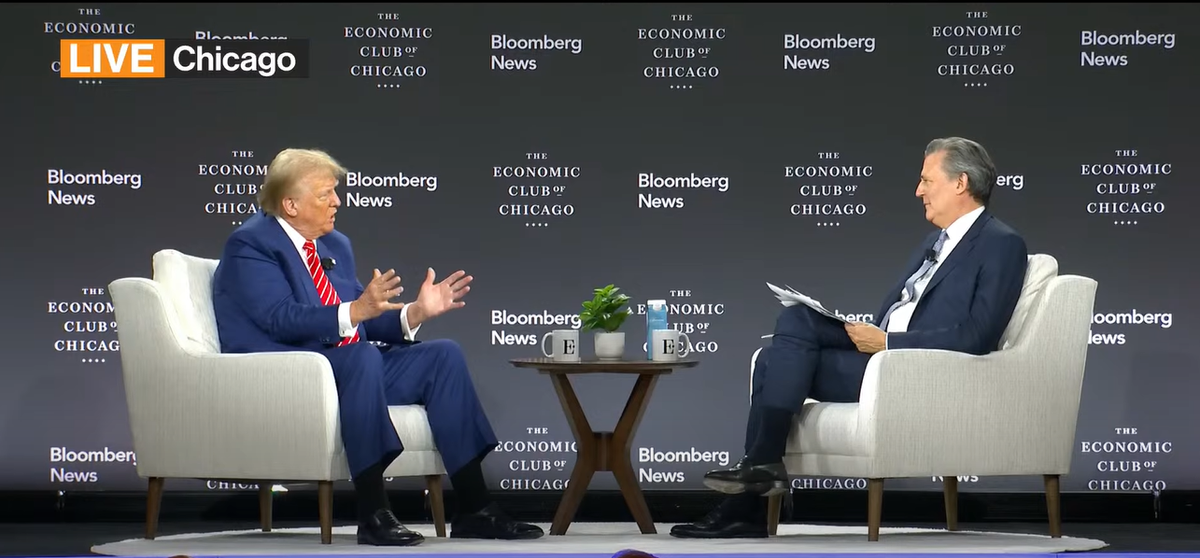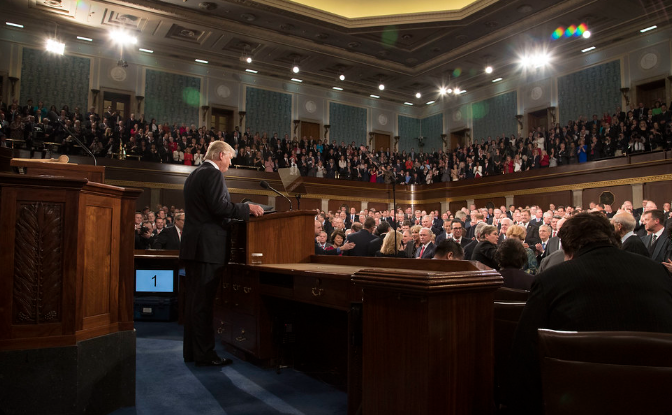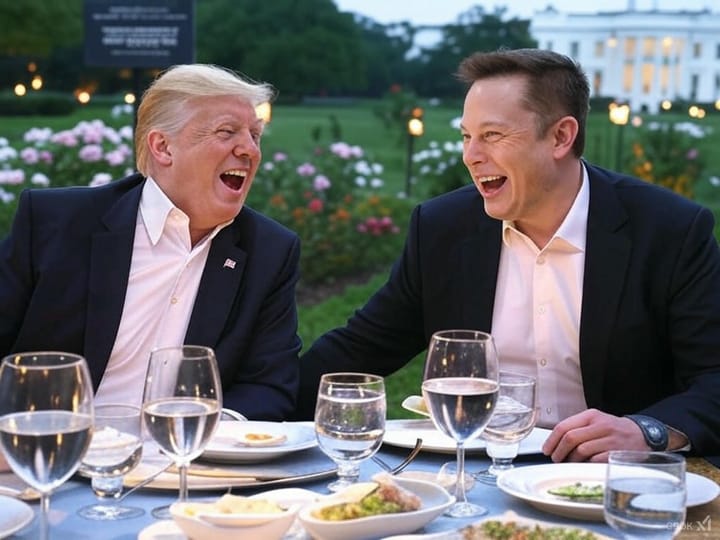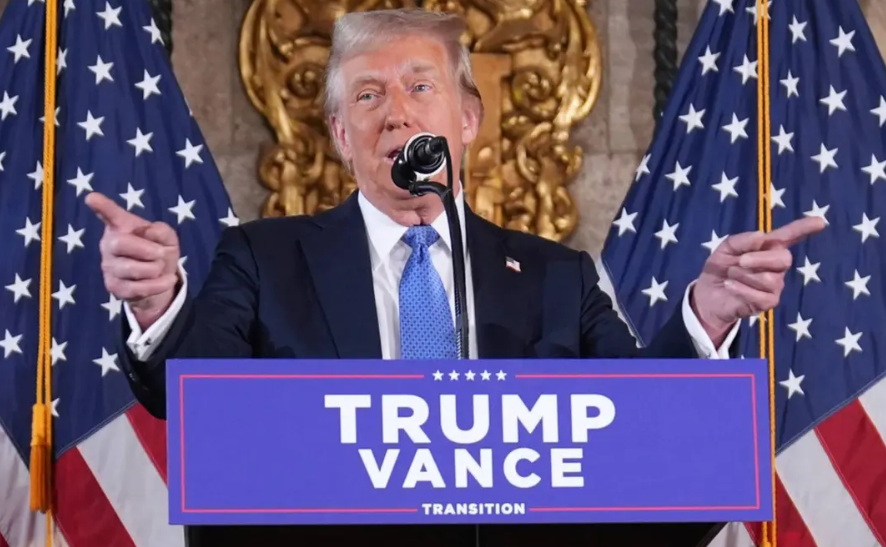Trump's Third Debate: Bloomberg Interview Recap
During his Bloomberg interview, Trump outlines his stance on tariffs, national debt, and immigration, reaffirming his vision for American economic security.

On October 15, 2024, former U.S. President and current Republican presidential nominee Donald Trump participated in an interview with Bloomberg News Editor-in-Chief John Micklethwait, hosted by the Economic Club of Chicago. The conversation covered a range of topics, including tariffs, trade, national debt, China, immigration, and the future of American industry. Trump's comments sparked debate, not only between him and Micklethwait but also among economic experts and viewers, providing insight into his economic philosophy and the potential impact of his proposals if he were to regain the presidency.
Trump's Tariff Strategy: Fairness and Economic Security
During the conversation, Trump elaborated on his approach to tariffs, stating, "Tariffs make sure our companies are treated fairly. If a company moves its production to another country, we will impose tariffs on them until they bring those jobs back to the U.S." He emphasized the importance of protecting American workers, asserting, "We have to protect our workers. Tariffs are about fairness, and it’s about time we demand it." Trump also argued that tariffs would act as a deterrent for companies seeking lower labor costs abroad, declaring, "If they want to build elsewhere, they will pay for the privilege of accessing the American market."
A major recurring theme throughout the interview was Trump's staunch advocacy for tariffs. He described tariffs as "the most beautiful word in the dictionary," emphasizing their role in safeguarding American companies and industries. Trump argued that tariffs would incentivize companies to relocate production to the United States, bolster domestic manufacturing, and drive economic growth. He maintained that tariffs are an essential tool to correct the imbalances created by unfair trade practices and to restore American industrial dominance.
Trump further elaborated on his stance regarding China, underscoring the need for substantial tariffs to counter what he perceives as unfair trade practices. He recounted an anecdote about a major automotive plant project in Mexico, which he claimed was abandoned once his renewed candidacy became apparent. Trump reiterated that, if elected, he would continue using tariffs as both a protective and punitive economic instrument, even suggesting tariffs as high as 300% for specific imports to deter foreign manufacturing. He argued that such high tariffs would be necessary to prevent multinational corporations from exploiting cheaper labor markets at the expense of American jobs.
While tariffs are often seen as a double-edged sword, Trump dismissed concerns about their impact on consumer prices, asserting that the long-term benefits of a thriving domestic manufacturing sector would far outweigh any short-term inconveniences. He portrayed tariffs as a vital mechanism to ensure that the United States is not beholden to foreign powers for critical goods and technologies, thereby enhancing national security and economic resilience. Trump’s confidence in tariffs as an economic remedy reflects his broader vision of America-first policies that prioritize sovereignty and self-sufficiency.
National Debt: Growth, Not Austerity
Trump remarked, "The debt will be handled by growth, not cuts. People keep saying we need austerity, but that’s not the answer." He added, "When we cut taxes, people have more money to spend, and businesses have more to invest. That’s how we create a booming economy." Trump further referenced his previous tenure, saying, "We did it once, and we will do it again. We had the best economy this country has ever seen."
Micklethwait challenged this perspective, citing reports suggesting that Trump's reliance on tariffs could escalate trade conflicts. Trump dismissed these concerns, asserting, "People said the same thing in 2018. They were wrong then, and they’re wrong now. We brought back millions of jobs, and we can do it again." He remained confident that an aggressive approach to foreign trade would yield economic dividends that would outstrip the debt increase.
Throughout the discussion, Micklethwait challenged Trump’s economic agenda, citing an analysis from the Committee for a Responsible Federal Budget, which projected that Trump's proposals could increase the national debt by $7.5 trillion. In response, Trump argued that his policies, including tax cuts and tariffs, would stimulate economic growth sufficient to offset any increase in debt. He dismissed concerns regarding rising debt levels, contrasting his growth-focused approach with Vice President Kamala Harris's policies, which he characterized as lacking in growth potential.
Trump insisted that his tax cuts would generate a significant boost in economic activity by increasing disposable income for both individuals and businesses, thereby spurring investment and job creation. He argued that the key to reducing the debt-to-GDP ratio lies in expanding the economy rather than cutting spending or raising taxes. According to Trump, a robust economy driven by manufacturing, energy independence, and innovation would eventually generate sufficient revenues to manage the national debt responsibly.
Micklethwait raised skepticism regarding Trump’s assertions, highlighting data indicating that tariffs could have adverse effects, including higher consumer prices and retaliatory actions from trading partners. Despite these arguments, Trump remained resolute, contending that his tariffs primarily aimed to pressure foreign manufacturers to relocate production to the United States, thereby enhancing job creation and domestic output. He pointed to the economic successes during his first term, including historically low unemployment rates and strong GDP growth, as evidence that his approach to economic policy could yield positive outcomes once again.
Immigration: Security and Merit-Based Policies
Trump reiterated, "We want people to come in, but they have to come in the right way. I’m not against immigration. I’m against illegal immigration." He continued, "When people come in without proper vetting, it puts our communities at risk." Trump argued that the best approach is a merit-based system, adding, "We want the best and the brightest, people who can contribute and are willing to respect our laws."
In response to Micklethwait's suggestion that immigrant labor is vital to some industries, Trump acknowledged, "I understand that, but there are legal ways to make sure our farms and factories have the workers they need." He added, "The difference is control. We need to know who’s coming in and ensure they’re adding to the country, not taking advantage of it." He emphasized the importance of striking a balance between welcoming new workers and maintaining security, stating, "America is a land of opportunity, but it has to be protected."
Immigration was another significant topic of discussion. Trump underscored his commitment to enforcing stricter immigration controls, stating, "I want a lot of people to come into our country, but I want them to come in legally." He highlighted what he deemed the dangerous repercussions of undocumented immigration, citing criminal activities by some individuals who entered the country unlawfully. Trump called for enhanced border security and the construction of additional barriers to prevent unauthorized entry.
Trump emphasized that a secure border was not just about preventing illegal crossings but also about protecting American workers from unfair competition. He argued that unchecked immigration undermines wage growth and strains public services, ultimately harming lower-income American citizens the most. Trump also expressed support for merit-based immigration, suggesting that the United States should prioritize highly skilled immigrants who can contribute to the nation's technological and industrial competitiveness.
Micklethwait, however, pointed out that many business owners, particularly in agriculture and manufacturing, depend on immigrant labor to sustain their operations. He argued that Trump's insistence on deporting undocumented individuals could adversely affect labor availability and economic growth. Despite these challenges, Trump maintained that securing the border and ensuring lawful immigration processes were more critical for the nation's long-term stability. He argued that a well-regulated immigration system would ultimately benefit both American workers and the economy by creating a more predictable and orderly flow of labor.
Trade and Foreign Policy: Fair Deals and Strong Stance
Trump said, "We have allies, but these allies have taken advantage of us for decades. We need fair deals." He pointed to the European Union, saying, "They tax our products so heavily, but we let theirs come in without any penalty. That has to change." Trump also addressed the importance of renegotiating military cost-sharing agreements, noting, "We are protecting these countries, and they’re not paying their fair share. It’s about time they start contributing more."
When Micklethwait asked if alienating allies could weaken American influence, Trump responded, "No one respects a weak America. They respect strength. When we negotiate tough, they might not like it, but they respect it." He pointed to renegotiated deals like the USMCA as evidence of his approach’s effectiveness, asserting, "We got a better deal for our farmers, for our manufacturers. We can do the same globally."
Trump's approach to foreign policy, particularly in relation to trade, was also scrutinized. He contended that previous administrations had allowed allies to exploit the United States, particularly through inequitable trade agreements. Trump criticized the European Union, Japan, and South Korea, asserting that they disproportionately benefited from deals made at America’s expense. He advocated for renegotiating these agreements to secure more favorable terms for the United States.
Trump argued that American leadership on the global stage should prioritize the interests of the American people, even if it meant challenging longstanding alliances. He asserted that his administration's renegotiation of trade agreements, such as the USMCA, had set a precedent for fairer and more reciprocal trade relationships. According to Trump, imposing tariffs on allies was a necessary step to compel them to renegotiate agreements that had unfairly disadvantaged American industries for decades.
Micklethwait questioned whether imposing high tariffs on allies might undermine American influence and weaken critical global alliances. In response, Trump argued that such firm measures were essential to ensure equity, asserting that America’s allies would ultimately respect and align with a stronger, more assertive United States. He contended that, in the long run, allies would benefit from a prosperous and economically independent America, which could better contribute to global security and stability.
Criticism of the Federal Reserve
Trump also expressed frustration with Powell’s response to the economic challenges during the COVID-19 pandemic, stating, "He didn’t cut rates fast enough, and we paid the price for that delay." He elaborated, "If we had acted quicker, we could have mitigated some of the worst economic impacts. The Federal Reserve has to work for the American people, not against them." Trump added, "Powell’s reluctance cost us valuable time, and we won’t make the same mistakes again."
Trump also criticized the Fed's focus on inflation over growth, saying, "The Fed has always been scared of inflation, but sometimes you need to take risks to grow. We can’t let fear of inflation stop us from building a booming economy." He asserted that a more proactive Federal Reserve would be key to achieving the ambitious growth targets outlined in his economic agenda.
In a particularly contentious exchange, Trump criticized Federal Reserve Chair Jerome Powell, implying that he might consider removing or demoting Powell if re-elected. Trump described the position of Federal Reserve Chair as "the greatest job in government" and expressed dissatisfaction with Powell’s management of interest rates during his previous administration. Trump reiterated his long-standing view that the Federal Reserve's rate policies had hindered economic growth, suggesting that, as a businessman, he could make more effective decisions regarding monetary policy.
Trump's criticism of Powell highlighted his belief that the Federal Reserve should be more aligned with the executive branch's economic goals, particularly in stimulating growth and managing inflation. He argued that Powell's reluctance to lower interest rates had stifled economic expansion and placed American businesses at a disadvantage. Trump's comments on the Federal Reserve reflect his broader view that monetary policy should be actively used to support industrial and economic policy, rather than being insulated from political considerations.
Vision for American Prosperity
Trump concluded the interview by stating, "We are the party of growth, of economic opportunity, and of making America strong again." He emphasized, "Our policies are about bringing jobs back, keeping our communities secure, and making sure the American dream is achievable for everyone." Characterizing the Republican Party as the "party of common sense," Trump reiterated core themes such as border security, fair trade, and economic growth. He argued that the GOP's platform aligned with the needs and values of everyday Americans and would facilitate a return to national prosperity. Trump portrayed his vision as one grounded in pragmatism, focusing on tangible outcomes that would improve the quality of life for American citizens.
However, Trump's reliance on unilateral measures, such as tariffs, continues to evoke divided opinions among economists and the public. His economic proposals—balancing tax cuts, tariffs, and stringent immigration policies—carry potential risks, including inflationary pressures and fiscal deficits, that have raised skepticism among analysts. Critics argue that Trump's policies could lead to increased trade tensions and economic instability, while supporters see them as a pathway to restoring American economic independence and competitiveness.
As the election campaign progresses, Trump's unwavering commitment to his economic agenda will be tested against the concerns of voters and analysts alike. The pivotal question remains whether the electorate will align with Trump's vision for an assertive and protectionist economic strategy, or whether they will opt for an alternative approach that prioritizes multilateralism and broader economic partnerships. With the nation facing numerous challenges—from economic uncertainties to complex immigration debates—the outcome of the upcoming election will have far-reaching consequences for the direction of American economic and foreign policy in the years to come.
Watch the Full Interview on YouTube. Credit: Bloomberg Television





Comments ()